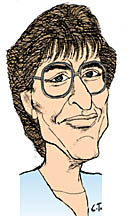
[ OUR OPINION ]
Public employee
unions want to keep
grip on the state
|

|
They are more candid when addressing their own members. A recent membership mailing by the Hawaii Government Employees Association warned that Lingle "wants a veto-proof Legislature to kill any bills benefiting your salary, retirement and health benefits."
In an interview with the Star-Bulletin's Richard Borreca, Russell Okata, the union's executive director, delivered a different message. "There is no difference between the working family and the public," he said, in their desire for "better schools, lower taxes and honest government."
By "honest government," Okata means a system under which state employees are provided unaffordable salary increases without having to go on strike. The 2000 Legislature enacted reforms proposed by then-Gov. Ben Cayetano that ended such binding arbitration of contract stalemates by nonessential state and county employees. Last year's Legislature voted to repeal the reforms and went into special session to override Lingle's veto of the repeal.
Arbitration was installed following a 1979 strike and has resulted in a windfall for public employees. Unions have learned that arbitrators will grant them what they want in wage increases if they ask for twice that amount. Arbitrators are in the habit of arriving at the conclusion that cutting wage-increase requests in half is a perfect compromise, regardless of whether the money is available to pay for the raises.
Public employee unions also have convinced Democratic legislators and arbiters that their collective-bargaining agreements supersede state and even federal law. In an arbitration case revealing its view of better schools, the United Public Workers union in 1995 successfully challenged a smoke-free policy adopted by the Hawaii school system in compliance with federal law, claiming that the smoking ban infringed on its union contract.
The Legislature stood behind UPW smokers, rejecting bills initiated by an irate Big Island parent. It finally took a threat by the U.S. Department of Education to fine the school system $1,000 a day of it continued to violate the nonsmoking provision of the federal Pro-Children Act of 1994. The smoking ban finally went into full effect six months ago.
The notion that Hawaii's public-employee unions act in the public interest is ridiculous. As Lingle says, "They are appealing to the most selfish aspects of the average citizen and they are narrowing the election to what this specific group will get as a personal benefit, as opposed to what is good for the state."
